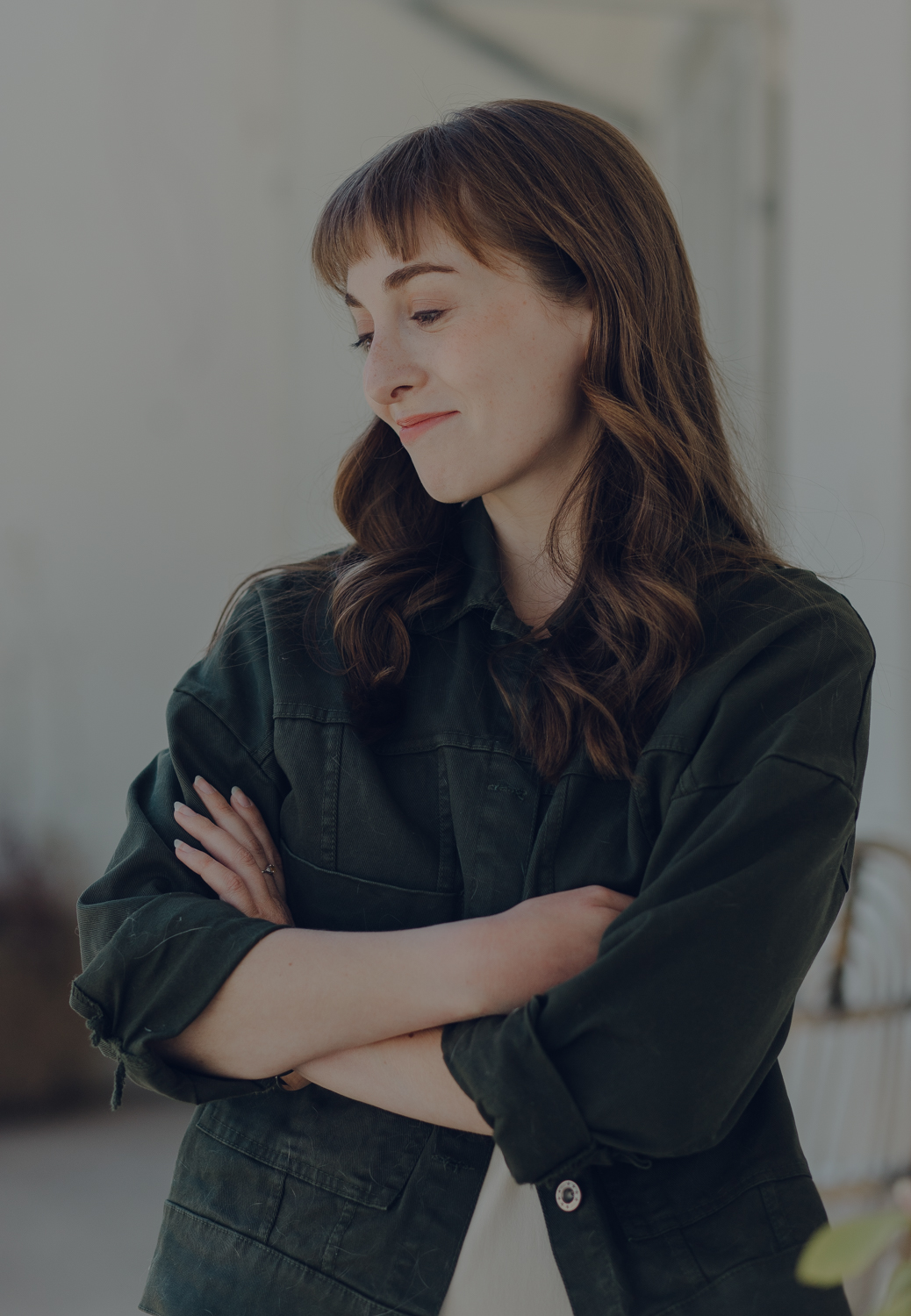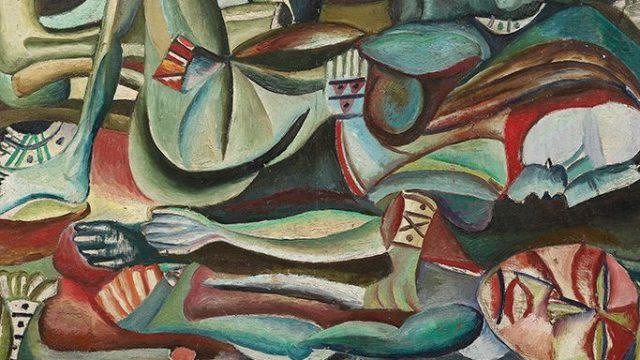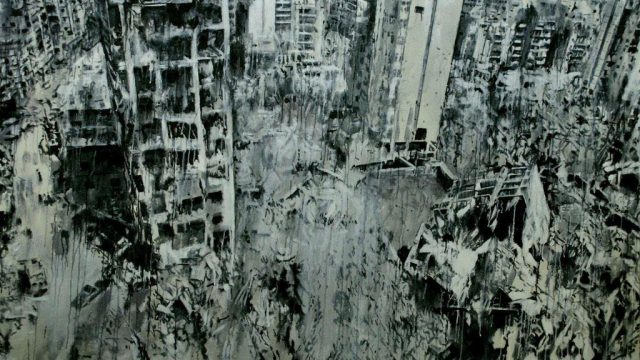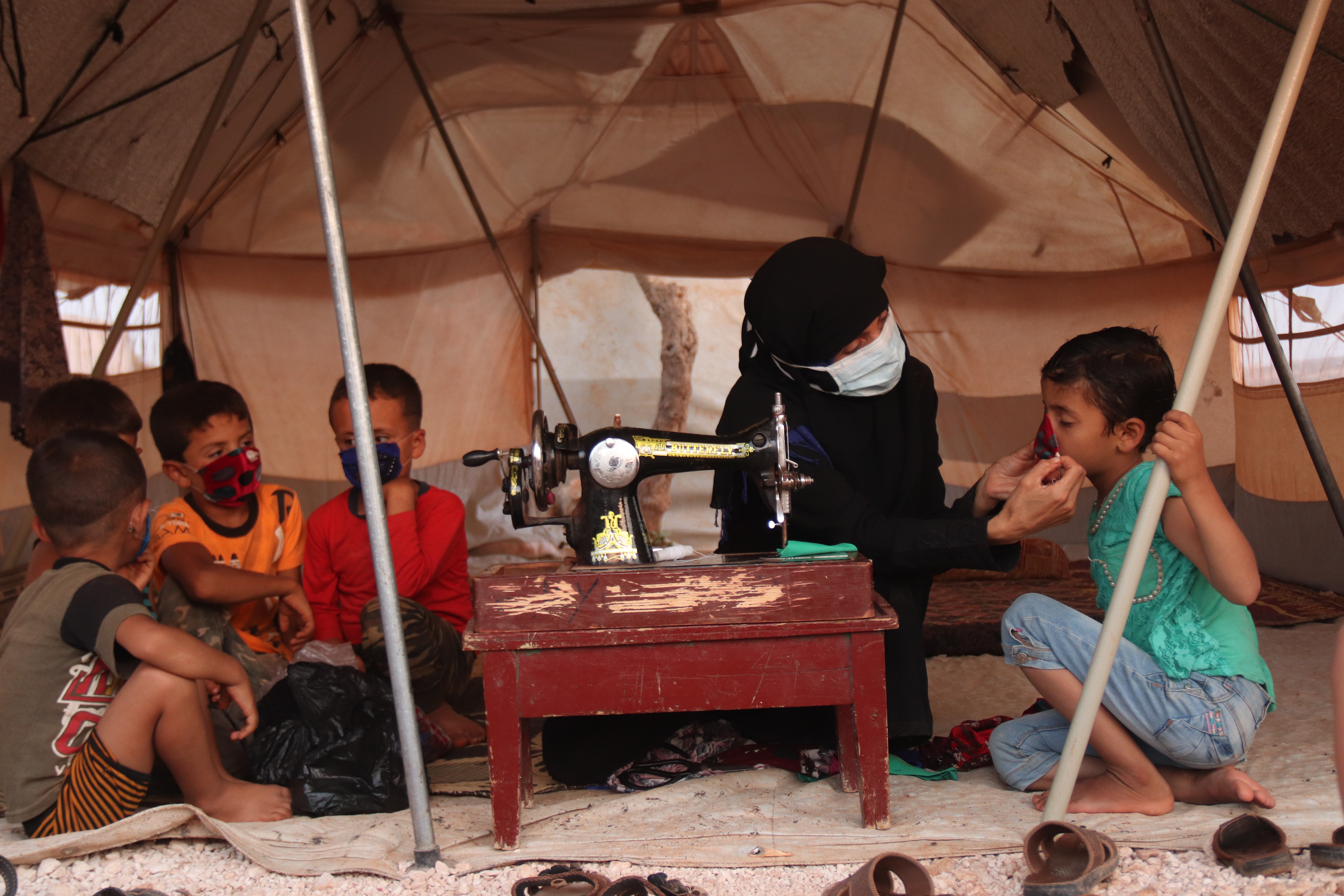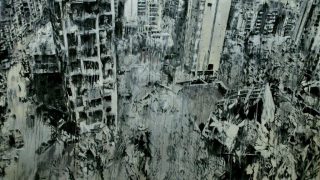To date, the COVID-19 pandemic has killed more than one million people worldwide, and driven countless others into months of lockdown and uncertainty. In Syria, the virus has killed silently as the government fails to report the full scope of its spread.
Syrians watching the crisis unfold in Damascus have reported increased burials in local cemeteries, and infected residents renting expensive oxygen cylinders for home use, as hospital beds remain full.
An unprecedented freefall in the Syrian lira since late last year has seen basic items such as food and gasoline become ever more difficult to afford. Then, in October, the Syrian government raised the price of subsidized bread. Photos showing hundreds of people lined up in city streets for bread soon unfurled across social media. All this as the war remains far from over in Syria's northwest, where bombs continue sporadically and millions remain in displacement.
“This is a year that has changed the world,” says celebrated Syrian writer Khaled Khalifa, whose wartime novel Death Is Hard Work was shortlisted for a National Book Award in 2019. Khalifa still lives in Syria, where he spends his time between his home in the Damascus district of Barzeh and a work studio on the sea in Latakia. There, he says, he has had much time this past year for contemplation, as well as fear.
SyriaUntold asked Khalifa how Syria’s year of suffering is reflected in his own work. What is the role of writing amid so much darkness?
What is the atmosphere like in your neighborhood, in Damascus’ Barzeh district?
It’s not just Barzeh. I believe that the situation everywhere in Syria, in every city, is difficult. Syrians’ poverty is very clear today. A true poverty. Entire families are either on the precipice of hunger, or already hungry. And most Syrians are waiting for aid to come from abroad, from their children or NGOs.
And of course, the regime does not care. It only cares about staying in place. But coronavirus has only added more struggle and pressure to all Syrians. There is a true indifference to this on the part of the regime.
Death notices and black market oxygen tanks: COVID-19 in Damascus
10 September 2020
Raqqa, at the center of the universe
16 August 2020
And in your area in particular?
I live in the part [of Barzeh] called Masbaq al-Sanaa. It is not an impoverished area; the residents are middle-class. Because of that, the situation here is better than in other places, such as Barzeh al-Balad, where there are many empty houses belonging to people who have left, and there are many people who are missing.
In general, those who pay the biggest price in this country are the poor. And today, the impoverished classes have become even more impoverished. The middle class has become poor. And of course, the wealthy are not concerned by this because they have money.
But in general, the situation is terrible. People are on the edge of true hunger.
This is a year that has changed the world. This is the one thing that connects Syrians to the world—that they are living beneath the sword of coronavirus. But of course, in Syria, there is a sort of indifference. Death exists here in all its forms, and coronavirus is only one of them.
Until now, it feels as if the war has not ended. There is still bloodshed, people are still leaving their homes, looking for any way possible to flee the country. Entire generations of young people are leaving[Syria] so that they aren’t conscripted to the army. This is placing great pressure on Syrians. The situation is far worse now than before; there is a sense that we are headed towards famine. There are people living on bread alone—bread, which is the most basic food item.
It is the poor who pay the price in war. They are the ones who fight on the frontlines, they are the ones who disappear and for whom nobody searches. Nobody cares for them, nobody asks after them.
Today people are dying without anybody knowing whether their death was caused by coronavirus or not. Dozens, hundreds of people have died, and the regime has no statistics, no information on the number of sick or the number of survivors.
How has all this impacted you on a more personal level?
Work has become more difficult. Projects have been delayed, travel is delayed, many things are delayed. At the same time, this has given me an opportunity for reflection: to reflect on myself, on others, those close to me and those far away.
And yet, there is a type of strange death, with a randomness to it, you can say. It makes me worry about my friends across the world. For example, I’m afraid for my friends in France, in Italy, in the US. I think about them, about how we will survive this pandemic.
This is despite the real tragedy that is going on, and the fear over what has happened. Within this fear is the fear that if anything happens to me, or to those who are close to me, we’ll be relying only on ourselves for treatment. The capabilities [for treatment in Syria] are very weak, and we’ll have to manage on our own.
I’ve been worried for my friends, for my family and those still living amid all this.
But the reflection has been authentic. This past February, March, April was the first time in years I’ve been granted this opportunity to re-organize my life and my writing, and even my relationship to art.
Can you talk more about how this year has changed your relationship to art—your own art and that of others? Do you feel that the pandemic and this year’s other crises will appear in your writing?
My relationship with writing—my main art—has not changed. But I’ve made reflections that are new for me. On language, on upcoming topics I’d like to write about. There has been a lot of time for this reflection, and it’s been a great opportunity.
Right now, I feel that I have no clear picture of how these days, or this year specifically, will appear in my writing. It’s something still ongoing. Since nearly a decade before coronavirus, we’ve been living with death nearby, and we’ve lost friends.
And yet, there is a type of strange death, with a randomness to it, you can say. It makes me worry about my friends across the world. For example, I’m afraid for my friends in France, in Italy, in the US. I think about them, about how we will survive this pandemic.
As you know, before coronavirus we believed that pandemics like this had ended: influenza, cholera. But it is clear now that nature is punishing us, that it is punishing all of humanity. And humanity still insists on battling nature. I believe that this will worsen in the days to come.
COVID-19 reveals the reality of governance in Syria
07 November 2020
In pictures: COVID-19 on the rise in northwestern Syria
14 November 2020
So I can’t yet draw a picture of how this coronavirus and hunger that we see today will manifest themselves in my upcoming writing.
You said earlier that the coronavirus has helped some Syrians feel more connected to the world, to humankind more generally. Do you still feel this is the case?
Syrians are sharing in this worldwide tragedy. This death is global. This pandemic is global. And Syrians are part of that world.
And yet, there are huge differences between Syrians and people in France [for example]. French people have officials who are in charge of their health system, of the health of their citizens.
Then there are countries like Syria where there are weaknesses, where there is still a war and now a pandemic—it’s something very cruel. They no longer feel that they are a part of the world; they’ve gone back to feeling as if they are on their own: that they are living this tragedy alone, and the world doesn’t give a damn.
Last time I interviewed you, in 2019, you told me that in war, death loses all meaning. There has been much more death in Syria since we last spoke, with the coronavirus, and now things are looking very grim with the financial crisis and the rising prices of food. Do you still feel the same?
Death still has lost its importance, its meaning. Syrians still die in many ways. They are still detained, they are still disappeared—we still don’t know where to. There is still torture. We still don’t know how their conditions are in the prisons. And alongside coronavirus, which is now yet another factor, we still have war, we still have bombs that may fall at any moment. Things are better, to a degree, in Damascus, and yet you still have areas like Idlib where four million people live [in harsh conditions] and nobody cares.
What about life? After nearly a decade of war, does it still have meaning for you? For Syrians?
In wars, life takes on a new meaning. For Syrians, there is a sense that the loss of hope is what’s truly terrifying. We don’t know where we are headed. Will things keep going as they are? As they’ve been for the past ten, 20, five years? And there is no longer any confidence in what we call the world community.
Syria today is a country occupied by four, five occupations. Turkey, America, Iran, Russia. And none of them know how they will form a new Syria.
How do you feel about writing about the present? What is the value of that?
Yes, there is an importance to this, especially as we are still facing a pandemic, and we are posing new questions on our relationship, as humans, to nature, on our crimes against this planet we call Earth. So there are questions that must be asked anew.
The world must think of a different and new way [of moving forward], of how to preserve the earth. Today we are facing a very dangerous question: will we still regard nature in the same way after the coronavirus ends? Will we still commit the same crimes against nature? We must rethink our ways.
We have one weapon [in this regard]: writing. Politicians are the ones who decide everything. That’s why this file must be opened in every country, not just Syria. Intellectuals and writers must inform the world of the coming danger. We must say in one voice that we are a part of this world.


